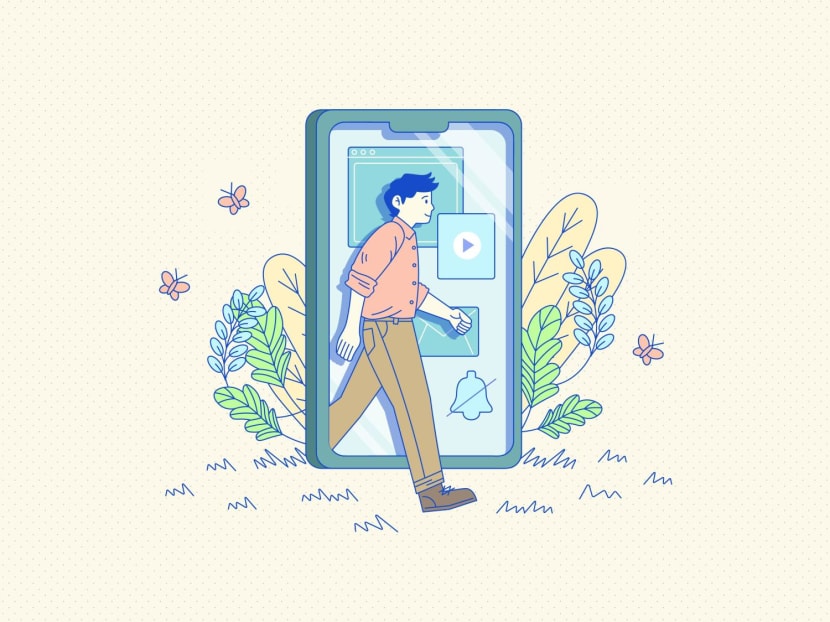Gen Zen: I went ‘cold turkey’ on my smartphone for a week. It made me happier and more productive — sort of

(Illustration: CNA/Nurjannah Suhaimi)
SINGAPORE — There is an abundance of academic studies that link excessive smartphone usage with health and psychological problems.
One 2023 study by University of Queensland researchers that I saw online found that more frequent smartphone use resulted in more severe symptoms of depression, anxiety, stress and poor sleeping quality, though I reckon one doesn't have to look very far to see examples of this among friends and acquaintances.
I’m not sure if the average of four hours a day I spend on my phone counts as excessive or problematic — the daily average for Singaporeans clocks in at 4.51 hours daily — but the prospect of potentially improving my mental well-being through less phone-time sounds appealing to me.
I’ve always romanticised the idea of living in a bygone, less tech-reliant era, where we don’t rush to our devices whenever a notification beckons.
So, when the idea of a “digital detox” was first floated by my colleagues, naturally, I put my name in the hat.
Last week, my colleague wrote an article detailing his unsuccessful attempt at “dopamine fasting”, though he somehow ended up spending even more time on his phone and on social media, when the goal was the exact opposite.
I decided I wasn’t going to fall into the same traps he did.
The rules I set myself were simple: For a week, I would go completely cold turkey on all forms of social media and leave my phone untouched as much as possible.
My iPhone 14 would be used the same way I would use an old-school Nokia — text and call only.
Smartphone? No, just phone.
WHY GO COLD TURKEY?
Well, why not?
Last week, an expert who spoke to my colleague suggested against going cold turkey, recommending instead that having a schedule would be more useful to wean oneself from digital devices.
I didn't want to doom my mission before it started, so I sought another expert for more answers.
Mr Ganesh, who goes by one name and is a senior counsellor at Viriya Community Services who has a specialist interest in addictions, told me that going cold turkey may prompt an immediate change in removing one's addictive behaviours.
However, the efficacy of the cold turkey as an intervention method largely depends on an individual's circumstances.
"Severe substance abuse, for example, may likely result in significant disruption to overall functioning. Hence, it may be more detrimental in the short-term to introduce a sudden stop without professional assessment," he added.
The ability to sustain the cold turkey treatment and manage its resulting withdrawals is another big obstacle.
Indeed, friends of mine who have successfully quit smoking have told me that while going cold turkey was the most effective tactic for breaking the habit, they experienced rather "painful" periods of nicotine withdrawal.
To combat this, Mr Ganesh pointed to research showing that the presence of "positive social support" helps with addiction recovery and reducing the risk of relapse.
So, to improve my chances of making it out of my digital detox successfully, I garnered the endorsement of some friends and family for my cold turkey plan and embarked on my mission.
Did going cold turkey on social media and superfluous phone use make me happier and more productive? Well, sort of.
RECLAIMING PRECIOUS ‘ME’ TIME
On the first night of the experiment, I decided I would take a stroll down to my neighbourhood coffee shop, phone-less, to order a bowl of bak chor mee (minced pork noodles) for dinner.
I was excited to finally be "untethered", and somewhat nostalgic of the times I used to attend primary school as a kid, unencumbered by the burden of the world in my palms.
That excitement merely lasted the duration it took me to walk from my door to the lift. I had never been so afraid of the elevator breaking down, or perhaps a family emergency occurring the minute I decided to partake in this silly experiment, where I would be completely unreachable.
Thankfully, nothing of that sort happened.
Then, as I sat in a corner of the busy eatery waiting for my order, I grew increasingly uneasy — fiddling my thumbs and scanning my surroundings like a restless child. A tangible itch started to surface between my temples that I tried hard not to scratch.
I studied every item on the large menu hung above the counter. Then I emptied the contents of my wallet and read the front and back of every card I owned. Then I counted the strands of hair I had above my knees.
More than my stomach, my mind was starving to occupy itself with something.
No doubt, I knew that if I had my phone with me, I wouldn't pay the slightest attention to my surroundings until my buzzer for my food rang.
I would continue to feel instances of this discomfort over the course of the week.
However, overall, I found that my self-imposed phone restrictions were a net positive.
On days that I didn’t have work, the inability to scroll mindlessly on online forum Reddit or watch YouTube videos meant that I often found myself standing in the middle of my room wondering what to do with my sorry self.
Forced to find a way to kill time, I was suddenly able do the things I always said I didn’t have time to do.
I managed to read several books that were gathering dust on the shelf, complete some unnecessarily complex jigsaw puzzles I found lying around, and reorganise my mess of a room more times than I can count.
When I did reach for my phone, it was a purpose-driven task to text or call the person I intended to, without inadvertently finding myself in the midst of my 50th YouTube Short an hour later, wondering how I got there.
This sense of accomplishment for being “productive” outside of work brought me a wave of happiness each time.
However, it also meant that there were no quick fixes for the moments in which I had to deal with difficult emotions. These were the toughest parts of my week-long experiment.
When I got stressed or annoyed, all I wanted was for a stand-up comedian to make me laugh, a conspiracy theory to make my mind wander, or a cheesy rom-com compilation to make me tear.
Essentially, I was looking to replace whatever negativity was within me with a quick dose of another, more pleasant emotion.
I wouldn’t consider the experience of having to sit there with my thoughts pleasant in the slightest.
Instead of distracting myself with the phone, I now had to confront my feelings head-on and acknowledge that they are there.
Doing that and opening up to people I am close to is a much healthier approach than suppressing my feelings, I reckon.
Indeed, clinical psychologist Maximillian Chen of Annabelle Psychology told me that using social media to distract from unpleasant emotions only brings about short-term relief. It leaves the root causes of unpleasant emotions unresolved and can potentially lead to poorer mental health in the long run.
Having open conversations with people you trust can help you better organise your thoughts and may bring about a more lasting resolution to the unpleasant emotions, he said.
I'm glad that was the option I chose.
STUBBORNNESS AND INCONVENIENCE
What I did not expect from this experiment was how my daily dependence on my phone for all other practical purposes, beyond just browsing on YouTube or social media, added to my frustrations.
My efforts to leave my phone untouched as much as possible felt increasingly futile over the course of the week as well.
When I was unable to connect my laptop to Wi-Fi networks outside, I required my phone to provide a hot spot to do work. When a family member suddenly complained of intense abdominal pains, I jumped to Google to find out what the problem might be.
Forgetting to take along cash, I needed my Wallet application to pay for public transport. When I had to drive a relative to the hospital urgently, I used Google Maps to guide me there.
At every instance where I reluctantly turned to my smartphone for help, I felt as though I had let myself down. Am I a slave to Big Tech after all? Am I not committed enough to this “digital detox”?
I spent a good portion of the week chiding myself for these supposed failures, but upon some reflection, I realised I shouldn’t have.
I wasn’t upset at having to use technology per se. I was annoyed at breaking my own rules.
In most of these instances, having technology at my fingertips was beneficial to me in helping me navigate life’s unexpected problems and inconveniences. The problem was the cold turkey.
Mr Chen of Annabelle Psychology had called it: While going cold turkey on my smartphone usage reduced its harms, it also reduced its benefits.
I could use physical Ez-Link cards, have some cash with me and carry road maps around, but does that make me cultured or just stubborn against change?
To completely remove oneself from using smartphones is, in my view, pointless given the society in which we live. Modern life in Singapore very much favours the digitally connected native (especially when restaurants stubbornly insist the only way to order food is by scanning a darned QR code).
On the other hand, equally counterproductive is allowing the addictive nature of social media to sweep you into the deep ocean of doom scrolling just so you won’t have to confront the hard things in life.
Perhaps there is another way.
Another colleague of mine also tried her own digital detox — with rules that are a lot more reasonable than mine. I can’t help but think a more balanced approach like hers would be more effective and less frustrating. So watch this space next week for her account of how that went.
In a book I read about digital minimalism by Cal Newport earlier on, he explained that the purpose of undergoing a digital detox such as this is to escape a state where “passive interactions with your screens is passive leisure”.
My brief but semi-successful abstinence from social media did open up new pockets of time that weren’t previously there to do things I previously wouldn’t have done.
I should give myself a pat on the back for that.








